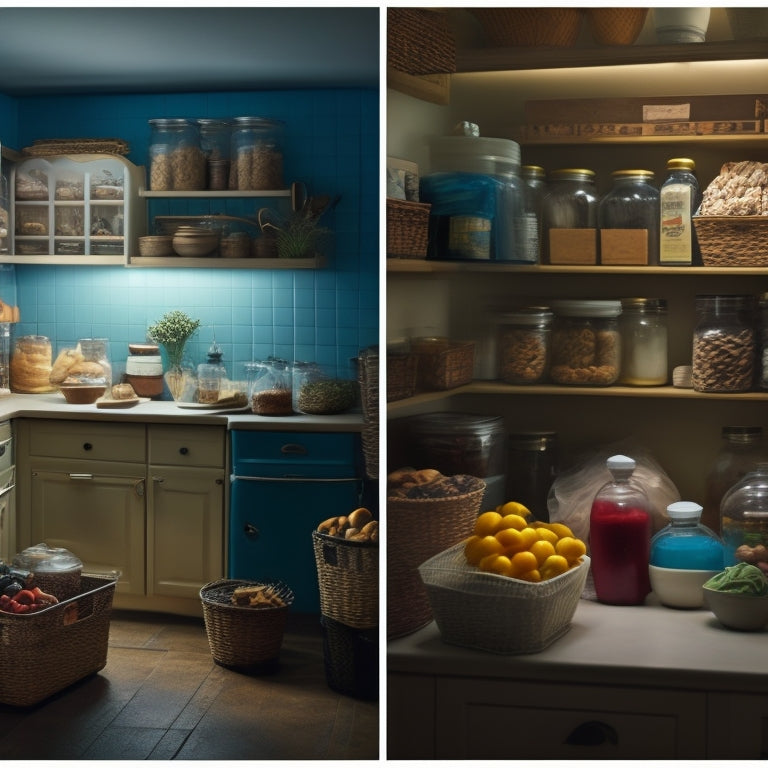
Maximize Freshness: Ultimate Food Storage Hacks
Share
To maximize freshness, grasping the intricacies of food storage is crucial. Counterintuitively, some fruits like bananas and apples emit ethylene gas, which can hasten ripening of other produce. Keep them apart in airtight containers to avoid premature ripening. In the refrigerator, designate shelves for produce and keep milk and eggs away from the entrance. When it comes to the freezer, arrange space efficiently and make use of ice cube trays for herbs and broth. By implementing these tactics, you'll prolong shelf life and maintain nutritional value. By delving deeper into these strategies, you'll unleash the full potential of your groceries and reduce food waste.
Key Takeaways
• Store fruits and vegetables separately to prevent premature ripening and spoilage.
• Designate specific areas in the pantry and fridge for fruits and vegetables to maintain freshness.
• Use airtight containers to store produce, and label and date leftovers for easy identification.
• Freeze herbs, broth, or wine in ice cube trays and meal prep in bulk to save time and money.
• Maintain a consistent refrigerator temperature below 40°F (4°C) to preserve nutritional value and freshness.
Counter Intuitive Storage Secrets
One surprising fact about fruit storage is that certain fruits, such as apples, pears, and bananas, release ethylene gas, which can actually help ripen other produce.
This ethylene effect can be harnessed to speed up the ripening process of fruits like avocados or peaches by storing them in a paper bag with an apple or banana.
Storing fruits and vegetables separately is crucial to prevent premature ripening.
Interestingly, ethylene gas can also have a negative impact on flowers, causing them to wilt faster.
To prolong their freshness, keep them away from fruits that release ethylene gas and avoid direct sunlight exposure, which can also accelerate produce ripening.
Smart Storage for Freshness
By understanding the unique storage needs of different fruits and vegetables, you can optimize their freshness and flavor by implementing a few simple strategies in your daily storage routine.
Effective pantry organization is key to maintaining freshness. Designate specific areas for fruits and vegetables, and store them in airtight containers to prevent moisture and air from affecting their quality.
For instance, store potatoes and onions in separate, well-ventilated containers to prevent sprouting and softening.
Implementing these simple strategies will help you enjoy your produce for a longer period while maintaining their flavor and texture.
Fridge Hacks for Longevity
Optimizing fridge storage is critical to preserving the freshness and nutritional value of perishable items, building on the foundation of effective pantry organization. By implementing a few simple strategies, you can extend the shelf life of your groceries and reduce food waste.
-
Store milk and eggs on shelves, not in the fridge door, to maintain a consistent temperature.
-
Keep leafy greens fresh by storing them in a sealed container or plastic bag.
-
Refrigerate cut or peeled produce to prevent spoilage.
-
Store herbs like parsley and cilantro in water to keep them fresh.
-
Designate a specific shelf for produce preservation, ensuring that fruits and vegetables are stored separately to prevent cross-contamination and premature ripening.
Freezer Storage Essentials
Proper freezer storage is an essential step in preserving the nutritional value and freshness of food, allowing you to enjoy your favorite meals and ingredients year-round.
Effective freezer organization is key to maximizing storage space and reducing food waste. Implement ice cube tricks by freezing herbs, broth, or wine in ice cube trays for convenient additions to future meals.
Meal prep and bulk freezing are also excellent strategies for saving time and money. Freeze individual portions of cooked meals, such as soups or casseroles, and label them for easy identification.
Additionally, consider freezing bulk items like meat, vegetables, and fruits to use in future recipes. By implementing these freezer storage essentials, you'll be able to enjoy your favorite foods throughout the year while maintaining their freshness and nutritional value.
Mastering Shelf Life
While effective freezer storage is vital for preserving food, understanding the shelf life of your groceries is equally important for minimizing waste and ensuring freshness. Mastering shelf life requires attention to storage containers, temperature control, and clever organization. Here are some essential tips to get you started:
-
Store fruits and vegetables in separate containers to prevent cross-contamination of ethylene gas.
-
Keep high-ripeness fruits like bananas and apples away from other produce to slow down ripening.
-
Use airtight containers to store dry goods like pasta and rice.
-
Label and date leftovers and store them in designated containers for easy identification.
-
Maintain a consistent refrigerator temperature below 40°F (4°C) to slow down bacterial growth.
Frequently Asked Questions
How Often Should I Clean My Fridge to Prevent Bacterial Growth?
To prevent bacterial growth, clean your fridge every 1-2 weeks, focusing on high-touch areas and shelves where raw meat, dairy, and leftovers are stored, and maintain a organized fridge layout to promote air circulation and easy cleaning.
Can I Store Open Jars of Condiments at Room Temperature?
When storing open jars of condiments, consider the case of ketchup, which can last up to six months at room temperature due to its high acidity. However, for best shelf life and freshness, pantry storage in a cool, dark place is recommended.
Are There Any Fruits That Should Not Be Washed Before Storing?
When storing fruits, handling them carefully is crucial to prevent moisture accumulation, which can lead to spoilage. Berries, grapes, and citrus fruits should not be washed before storing, as excess moisture can accelerate fruit ripening and decay, compromising proper storage.
Can I Use Aluminum Foil to Store Food in the Fridge or Freezer?
Like a perfectly wrapped gift, your food deserves the right covering. Avoid using aluminum foil to store food in the fridge or freezer; instead, opt for plastic wrap or innovative silicone lids as a reliable alternative for freshness preservation.
How Do I Prevent Freezer Burn on Frozen Meats and Vegetables?
To prevent freezer burn on frozen meats and vegetables, employ proper packaging techniques, ensuring airtight seals and moisture control, and use materials like freezer bags or vacuum-sealed containers to preserve quality and maintain freshness.
Related Posts
-

Streamline Your Kitchen Amplify Your Productivity
You spend a significant amount of time in the kitchen, but clutter and disorganization can add extra minutes to your ...
-

Why Renters Need Creative Kitchen Storage Solutions
You're likely no stranger to the frustrating reality of limited kitchen storage, where every inch counts and clutter ...

